初一英语上册[教材]
2024秋季新教材冀教版七年级上册英语Unit3 Lesson 1 教学课件

【易混辨析】 speak、say、talk和tell
Can you do my homework for me, Robin?
Text
Sorry, I can’t do your homework, but I can help you with your housework.
Language Points
1. 表示身体(body)部位的单词: head头; eye眼睛; nose鼻子; mouth嘴巴; neck脖子; arm胳膊;elbow肘部;hand手;finger手指; leg腿;knee膝盖; foot脚;toe脚趾。
Alice: Yes. ____C______
Robin: Me too. Let's be friends!
Let’s Do It!
2. Do you like robots? Draw a picture of a robot and then introduce it to your classmates.
Let’s Do It!
3. Listen and repeat. Write more words in each group.
/e/ smell ten _b_e_d_d_e_s_k_y_e_s _b_re_a_d__m_a_n_y_________ /æ/ am can _b_a_g__ha_n_d__a_n_d_b_la_c_k__fl_ag_____________ /au/ about mouth _h_o_u_s_e_fl_o_w_e_r_n_o_w__d_ow__n_h_o_w_____ /əu/ nose also _ho_m__e_c_o_ld__sh_o_w__b_o_a_t _gr_o_u_n_d___ /iə/ ear hear _d_e_er__id_e_a__n_ea_r_h_e_r_e_t_h_ea_t_e_r___
七年级上册英语课本
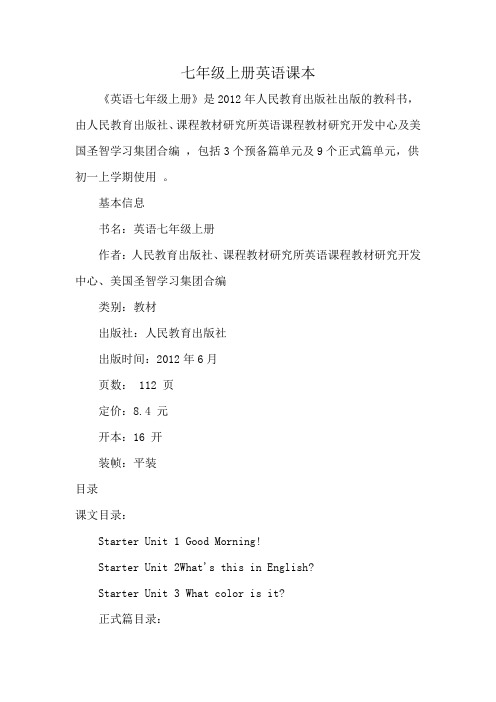
七年级上册英语课本《英语七年级上册》是2012年人民教育出版社出版的教科书,由人民教育出版社、课程教材研究所英语课程教材研究开发中心及美国圣智学习集团合编,包括3个预备篇单元及9个正式篇单元,供初一上学期使用。
基本信息书名:英语七年级上册作者:人民教育出版社、课程教材研究所英语课程教材研究开发中心、美国圣智学习集团合编类别:教材出版社:人民教育出版社出版时间:2012年6月页数: 112 页定价:8.4 元开本:16 开装帧:平装目录课文目录:Starter Unit 1 Good Morning!Starter Unit 2What's this in English?Starter Unit 3 What color is it?正式篇目录:Unit 1 My name's Gina.Unit 2 This is my sister.Unit 3 Is this your pencil?Unit 4 Where's my schoolbag?Unit 5 Do you have a soccer ball?Unit 6 Do you like bananas?Unit 7 How much are these socks?Unit 8 When is your birthday?Unit 9 My favorite subject is science.Notes on the TextTapescriptsPronunciationGrammarWords and Expressions in Each UnitVocabulary IndexName List语言目标Unit 1:Letters A-H, Greet people 字母A-H,问候他人Unit 2:Letters I-R, Identify things, Spell words 字母I-R,辨认物品,拼写单词Unit 3:Letters S-Z, Identify colors 字母S-Z,辨认颜色正式篇Unit 1:Introduce yourself, Greet people, Ask and give telephone numbersUnit 2:Introduce people, Identify peopleUnit 3:Identify ownershipUnit 4:Talk about where things areUnit 5:Talk about ownershipUnit 6:Talk about likes and dislikesUnit 7:Ask about prices, Talk about closing, Offer help, Thank someoneUnit 8:Talk about datesUnit 9:Talk about preferences, Give reasons。
[教材]初一英语课文
![[教材]初一英语课文](https://img.taocdn.com/s3/m/b69e3a1953ea551810a6f524ccbff121dd36c5c6.png)
初一英语课文初中英语第一册课文第一课teacher:good morning,class.student:good morning,teacher.teacher:sit down,please.teacher:My name is Gao Hui.What is your name? LiLei:Li Lei第二课1.Han Meimei:HelloJim:HelloHan Meimei:My name is Han Meimei What's your name?Jim:My name is Jim Green.2.Jim:How are you,Miss Gao?teachter:Fine,thank you.第三课1.Li Lei:Hello,Jim!How are you?Jim:Fine,thank you,Li Lei.How are you?Li Lei:I'm fine too.2.Gao:Good morning,Mr Wang!Wang:Good morning.Sit down,please.Gao:Thank you.第五课1.KateGreen:Hello!My name is Kate Green.2.Jim Green:Hello!I'm Jim Green.Polly:And I'm polly!3.Gao:Hello!Are you Wei Hua?Wei Hua:yes, I am.4.Hello!are you Lu Ming?Li Lei:No, I'm not.I'm Li Lei.第六课1.Li Lei:Hello,Jim.Jim:Hello,Li Lei.Li Lei:This is Wei Hua.Wei Hua,this is Jim.2.Jim:Hello, Wei Hua! Nice to meet you.Wei Hua:Hello,Jim!nice to meet you.How are you? Jim:Fine,thank you.And you?Wei Hua:I'm OK.第九课1.Ms.:Good afternoon!Sir:Good afternoon!Ms.:Are you Mr Green?Sir:No,I'm not.Ms.:sorry.2.Li Fen:Excuse me!Are you Mr Green?Mr Green:Yes,I am.Li Fen:Oh,good!I'm Li Fen.Mr Green:How do you do?Li Fen:How do you do?第十课Teacher:What's your name,please?Sun Huimin:My name's Sun Huimin.Teacher:Can you spell it,please?Sun Huimin:Yes,S-U-N Sun,H-U-I-M-I-N Huimin.第十一课1.Li Lei:Jim,what's this in English?Jim:it's a book.2.Li Lei:What's this in English?Jim:It's a pen.Li Lei:And what's this?Jim:it's a desk.第十二课S: Good Morning ,Miss Gao .T: Good morning!What's your name,please?S: My name is Fang Xiaoling.How are you,Miss Gao?T: I'm fine ,thanks . And you?S: I'm fine,too. Excuse me,Miss Gao, what's this in English?T: It's a book .S: Can you spell it ,please?T: Yes. B-double O-K,book .S: Thank you.Goodbye!T: Goodbye!第十四课Han Meimei:Hi,Ann!What class are you in?Ann:I'm in class3,Grade 1.Are you in Grade 1, too?Han Meimei:Yes,I'm in Class 4.第十五课1.Li Lei:Polly,what's one and two?Polly:Er.um.four.Li Lei:No!Three!2.A : How old are you ?B : I ' m eleven. How old are you ?A : I ' m twelve .3.A : Are you ten ?B : No ,I ' m not. I ' m eleven. Are you twelve ?A : Yes,I am.第十六课A: Hello ! What ' s you name?B: My name is Ma Lili.A: How old are you?B: I ' m twelve. What ' s your name , please?A: Mrs Read .B: Can you spell it , please?A: Yes . R-E-A-D , Read.B: How old are you?A: Ah , it's a secret!第十七课Li Lei:What's this in English?Jim:It's a clock.Li Lei:And what's this?Jim:It's a pencil-box.第十九课Li Lei:What's this in English?Jim:It's a bike.Li Lei:What's that in English?Jim:It's a bus.Li Lei:Is that a car?Jim:No.it isn't It's a jeep.Jim:Look!That's a car.Li Lei:Yes.It's a Chinese car.Li Lei:Is that an English car?Jim:No,it isn't.It's a Japanese car.Jim:That's an English car!第二十一课1.A : Who's that ?B : That's Su Weifang .A : How old is she ?B : I think she ' s twelve .2.A : Who's that ?B : I think he's Mr Zhang .A : How old is he ?B : I don't know .I think he's very old .第二十三课1.T:Is everyone here today?S:No.T:Who's not here?S:Liu Fang is not here.T:Is she at school today?S:Sorry,I don't know.S:No,she isn't.T:Where is she?S:I think,she's at home.2.SAM : Hello ! 6098724 .MIKE : Hello , Bill ?SAM : No , this is Sam .MIKE : Hi,sam .This is Mike. How are you ?SAM : Fine , thanks , Mike .MIKE : Is Bill in , Sam ?SAM : Sorry , he ' s not at home .MIKE : OK.Thank you. Goodbye !SAM : Bye !第二十五课1.A : Excuse me ! Is this your pencil-box ?B : Yes,it is.A : Here you are !B : Thank you .2.A : Is this your eraser ?B : No , it isn ' t . I think it ' s her eraser .A : Han Meimei , is this your eraser ?C : Yes , it is . Thanks !A : That ' s OK .3.A : Where ' s my cup ? Is that my cup ?B : No , I think it ' s his cup .A : Jim , is this your cup ?C : Oh , yes , it is .A : Here you are .C : Thanks !A : But where ' s my cup ?第二十六课A : Excuse me ! Is this your picture ?B : Yes , it is.A : It ' s very good !B : Thank you.第二十七课1.A: Are these English books?B: Yes , they are .A: Are they your books?B: No , they aren't . They ' re their books .2.A: Excuse me !B: Yes?A: Are these your apples?B: No , they aren ' t.A: Excuse me !C: Yes ?A: Are these your apples ?C: Oh,yes,they are.A: Here you are.C: Thank you very much.A: That's all right.第三十课POLICEMAN : Excuse me ! Is this your bike ?MAN : No,it isn't . Ask that woman. I think isn't her bike.POLICEMAN : Excuse me !WOMAN : Yes ?POLICEMAN : Is that your bike ?WOMAN : No,that's not my bike .POLICEMAN : Is this your bike ?BOY : Yes , it is .POLICEMAN : How old are you ?POLICEMAN : Can I see your licence , please ?BOY : OK .BOY : Here you are .POLICEMAN : That ' s all right . Thank you . Goodbye ! BOY : Thank you . Bye-bye .第三十二课My name is jim Green .I am twelve . This is my school .It is No.14 Middle School .My teacher ' s name is Miss Gao .At school I have a friend .His name is Li Lei .Now answer the questions in the workbook .第三十三课1.T:Good morning,class!Who's on duty today?S:I am.T:Are we all here?S:No.T:Who isn't at school today?S:Li Ming and Wei Fang.T:Where are they?S:I don't know.They aren't here.I think they are at home.2.A : What row are you in ?B and C: We are in Row One .A : What row are they in ?D : They're in Row One .第三十四课TEACHER: Er , this is Lucy , and er , this is Lily .LUCY: I'm not Lily . I'm Lucy . She's Lily !LILY: I'm not Lucy . I'm Lily . She's Lucy !TWINS: We're twins !TEACHER: Sorry! You look the same!TWINS: That's OK !TEACHER: Are you English ?TWINS: No,we're American .TEACHER: OK . Please sit down over there .第三十五课1.TEACHER: Han Meimei , please look after the twins today . MEIMEI : Yes , Miss Gao . Hello!This way , please .TWINS : Thank you .MEIMEI : How old are you ?TWINS : We're eleven .MEIMEI : What row are you in ? Do you know ?LUCY : No, we don ' t .MEIMEI : You ' re in Row Four .LILY : Am I in the same row ?MEIMEI : Yes, you are .LILY : Good! Thanks .MEIMEI : That ' s OK .2.LUCY : Can we put our coats here ?MEIMEI : Oh yes , put them here .LUCY : Excuse me . Where' s the toilet , please ?MEIMEI : The toilet? Oh, it's over there. This way , please .第三十六课LILEI : Hello,Jim.JIM : Hello,LiLei.Who are they?LILEI : Oh,sorry!This is Lucy. This is Lily.They're new. Lucy,this is my friend Jim.LUCY : Hi,Jim.Nice to meet you.JIM : Nice to meet you too! What class are you in?LILY : We're in Class Three,Grade One.JIM : Oh,good.We're in the same class.LILY : Excuse me,are you American,too?JIM : No,I'm English.第三十七课1.A: Who's that ?B: It is Kate ?A: Yes , I think you're right .It's Kate .2.A: Who's that ?B: The girl in the hat? I don't know . Is it Lucy or Lily ? A: I don ' t know . They look the same .第三十八课A : Can you see the door ?B : Yes , I can .A : Where is it ?B : It ' s here .Can you see an orange ?A : No , I can ' t .第三十九课1.A : Where is Lucy's coat ?B : Is it on the desk ?A : Yes , it is .2.A : Where is Lucy's bag ?B : Is it behind her chair ?A : Yes , it is .3.A : Where are the balls?B : Are they under the chair?A : No , they aren't . They're on the floor .4.A : Where ' re Lucy ' s pencils ? Are they on her desk ?B : I can ' t see . I think they ' re in her pencil-box .5.A : Where's her hat ? Is it under her chair ?B : Yes , it is .6.A : No,it isn't! That's a cat !B : A cat ? What's its name ?A : I don't know .第四十课TEACHER : What are those ?TWINS : They are our coats , Miss Gao .TEACHER : Put them over there , please .TWINS : Yes , Miss Gao .TEACHER : Meimei , what ' s that ?MEIMEI : Oh , that ' s Lucy ' s hat .TEACHER : It looks like a cat ! Put it in your desk please , Lucy .LUCY : Yes , Miss Gao .第四十一课LILEI : Hi , Jim ! What 's that ?JIM : It 's a picture of my family .LILEI : Oh , can I see it ?JIM : OK !第四十二课1.A : Who ' s that ?B : That ' s Jim ' s sister .A : Who ' re they ?B :They ' re Jim ' s father and mother .2.JIM : Oh good , it ' s LiLei . Hi , LiLei !LILEI : Hello , Jim . Good ! You're at home . How are you ?JIM : Fine , thank you . How are you ?LILEI : I ' m fine , too , thanks .JIM : Nice to see you . Please come in . This way , please . LILEI : OK ! Thanks .第四十三课1.JIM : Dad , this is LiLei .LiLei , this is my father .LILEI : Good afternoon , Mr Green .FATHER: Good afternoon , LiLei! Nice to meet you . How do you do ?LILEI : How do you do ?FATHER: Please sit down .LILEI : Thank you .JIM : Dad , this is LiLei . LiLei , this is my father .LILEI : Good afternoon , Mr Green .FATHER: Good afternoon , LiLei! Nice to meet you . How do you do ?LILEI : How do you do ?FATHER: Please sit down .LILEI : Thank you .2.KATE : Oh , this is my cat , Mimi !LILEI : Hello , Mimi! You look like Lucy's cat!KATE : Who ' s Lucy ?JIM : She's a new student . She's American .LILEI : But her cat's Chinese !第四十五课A : What can you see in the picture ?B : I can see a kite .A : Where ' s the kite ?B : It ' s on the wall . What can you see ?C : I can see a football .B : Where ' s the football ?C : It ' s .... What ... ?D : I can see ....2A : What can you see in the bedroom ?B : I can see some flowers .A : Where ' re the flowers ?B : They ' re on the desk.What ...?C : ....第四十六课1.JIM : Excuse me , Han Meimei . I can't find the broom . Can you see it ?MEIMEI : I ' m sorry , I can't . Is it under the teacher's desk ?JIM : No , it isn ' t .MEIMEI : Er , is it under that window ? No , it isn ' t .MEIMEI : I know ! It ' s behind the door !JIM : Yes , you ' re right ! Thanks .2.LUCY : Excuse me , LiLei . I can ' t find my pen.LILEI : I can see it . Look ! It ' s over there , under the desk . LUCY : Thank you . Oh ! That ' s not my pen . It ' s Lily 's !第四十七课MEIMEI : Where's Wuhan ? Do you know ?LILY : Er , is it in Hebei ?MEIMEI : No . It's in Hubei .LILY : Hubei ? I can't find it .Where is it? MEIMEI : It's here .第四十八课Where ' s the apple ?A : Is it in your desk ?B : No , it isn ' t .A : Is it in your bag ?B : No , it isn ' t .A : Is it in your bag ?B : Yes , it is ! It ' s your turn now , A .第四十九课A : What's that over there?B : Where ?A : Over there , on the hill .B : It ' s a car .A : What colour is it ?B : It ' s red . It ' s a red car .A : Is that a car , too ?B : Yes , it is .A : What colour is it ?B : It ' s black . It ' s a black car .第五十课MEIMEI : Excuse me , Jim . Who ' s that man ?JIM : Which man ?MEIMEI : The one in the white car .JIM : Oh , that ' s my father !JIM : Meimei , who ' s that boy ?MEIMEI : Which boy ?JIM : The one on the black bike.MEIMEI : Oh , he ' s Lin Tao .MEIMEI : Jim , who's that woman ?JIM : Which woman ?MEIMEI : The one in the red coat .JIM : Oh , that ' s Mrs Brown .MEIMEI : Who ' s that girl ?JIM : Which girl ?MEIMEI : The one behind the tree .JIM : Oh ,that's my sister , Kate. Come here , Kate . I can see you .第五十一课A : What are these?B : Can ' t you see? They're boxes !A : Yes , but what are in the boxes ?B : Oh , sweaters .A : What colour are they ?B : They ' re blue .第五十二课A : What can you see in Picture 1 ?B : I can see a sweater .A : What colour is it ?B : I think it ' s green .A : OK ! Colour it green , please !B : OK!第五十四课1.TEACHER : Whose is this shirt ? Is this yours , LiLei ?LILEI : Let me see , please .No , it ' s not mine. I think it ' s his .TEACHER : Whose ? Jim ' s ?LILEI : Yes .TEACHER : Jim , is this yours ?JIM : Yes , it ' s mine .TEACHER : Here you are , Jim . You must look after your clothes ! JIM : Yes , thank you , Mr Hu.2.TEACHER : Whose is this sweater ? It look like yours , Han Meimei . Let me see , Please . No , it ' s not mine . I think it ' s hers .TEACHER : Lucy , is this yours ?LUCY : No , it isn ' t mine .I think it ' s Lily ' s .TEACHER : Put it on , please , Lily .You must look after your clothes !LILY : Thank you . Miss Gao .第五十五课TEACHER : Whose sweaters are these?MEIMEI : Theirs , I think .TEACHER : Whose ? The twins' ?MEIMEI : Yes .TEACHER : Thank you .Lucy and Lily, come here , please .TEACHER : Are they yours ?TWINS : Yes , they ' re ours .TEACHER : Here you are . Put them on , please . You must look after your clothes .TWINS : Yes , thank you , Miss Gao .第五十七课1.JIM: What ' s that ?LILEI: It ' s my watch .JIM: That ' s nice . Is it new?LILEI: Yes , it is .JIM: You must look after it. Give it to Mr Hu .LILEI: OK . Thanks .2.LILEI: Excuse me , Mr Hu .Can you look after my watch , please ?MR HU : OK .LILEI: Thank you very much .第五十八课MR HU : Whose is this watch ?LILEI : Is it a black one ?MR HU : Yes , it is.LILEI : I think it ' s mine . Yes , it is .MR HU : Here you are !LILEI : Thank you very much .第五十九课A: Excuse me . What ' s the time , please ?B: Sorry , I don ' t know . My watch is at home .A: Hi , Jim . What ' s the time ?C: Let me see . It's about four thirty .A: Thanks very much . I must go !第六十三课1.LILEI : What ' s that , Jim ? Is it a picture ?JIM : Yes , it ' s an old photo of my family . LILEI : Can I see it ?JIM : OK . Look , here are my father and mother .LILEI : They look young ! Who ' s that man ?JIM : The on behind my mother ?LILEI : Yes .JIM : That ' s my mother's brother .LILEI : He looks young , too .2.LILEI : Who ' s that ?JIM : Who ? The baby ?LILEI : yes .JIM : Guess !LILEI : Is it your sister , Kate ?JIM : No !LILEI : Is it your brother?JIM : No !LILEI : I know - it ' s you !JIM : Yes , I look young , too !LILEI : How old are you in the picture ? JIM : I don ' t know . One , I think .。
英语人教版(2024版)七年级初一上册Starter Unit 3 Welcome SectionB
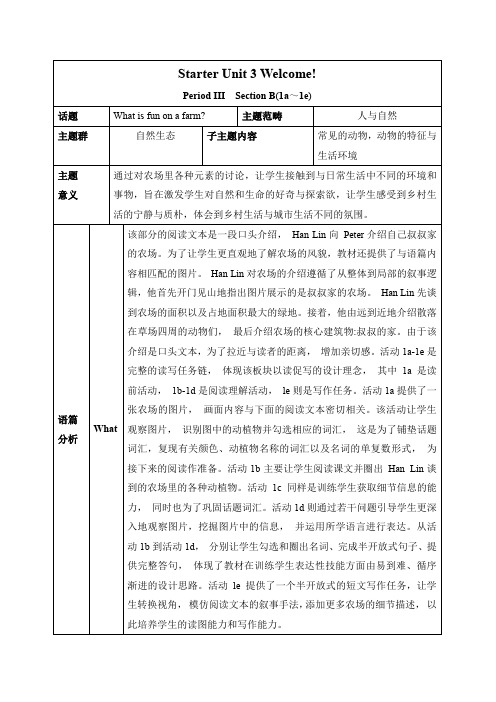
Starter Unit 3 Welcome!Period III Section B(1a~1e)话题What is fun on a farm?主题范畴人与自然主题群自然生态子主题内容常见的动物,动物的特征与生活环境主题意义通过对农场里各种元素的讨论,让学生接触到与日常生活中不同的环境和事物,旨在激发学生对自然和生命的好奇与探索欲,让学生感受到乡村生活的宁静与质朴,体会到乡村生活与城市生活不同的氛围。
语篇分析What该部分的阅读文本是一段口头介绍,Han Lin向Peter介绍自己叔叔家的农场。
为了让学生更直观地了解农场的风貌,教材还提供了与语篇内容相匹配的图片。
Han Lin对农场的介绍遵循了从整体到局部的叙事逻辑,他首先开门见山地指出图片展示的是叔叔家的农场。
Han Lin先谈到农场的面积以及占地面积最大的绿地。
接着,他由远到近地介绍散落在草场四周的动物们,最后介绍农场的核心建筑物:叔叔的家。
由于该介绍是口头文本,为了拉近与读者的距离,增加亲切感。
活动1a-1e是完整的读写任务链,体现该板块以读促写的设计理念,其中1a是读前活动,1b-1d是阅读理解活动,le则是写作任务。
活动1a提供了一张农场的图片,画面内容与下面的阅读文本密切相关。
该活动让学生观察图片,识别图中的动植物并勾选相应的词汇,这是为了铺垫话题词汇,复现有关颜色、动植物名称的词汇以及名词的单复数形式,为接下来的阅读作准备。
活动1b主要让学生阅读课文并圈出Han Lin谈到的农场里的各种动植物。
活动1c同样是训练学生获取细节信息的能力,同时也为了巩固话题词汇。
活动1d则通过若干问题引导学生更深入地观察图片,挖掘图片中的信息,并运用所学语言进行表达。
从活动1b到活动1d,分别让学生勾选和圈出名词、完成半开放式句子、提供完整答句,体现了教材在训练学生表达性技能方面由易到难、循序渐进的设计思路。
活动le提供了一个半开放式的短文写作任务,让学生转换视角,模仿阅读文本的叙事手法,添加更多农场的细节描述,以此培养学生的读图能力和写作能力。
Unit 2 Section A(1a-2e)课件人教版2024新教材七年级上册英语
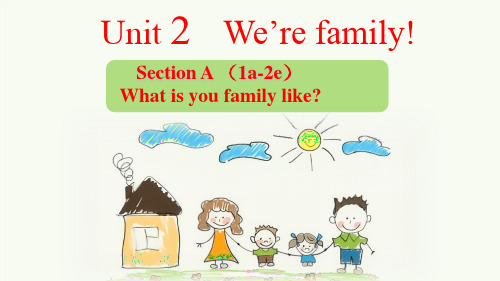
who is sb?询问人物的身份
Teng Fei: Is this your brother? Peter: No, it's my cousin, David. This is my brother, Jim.
cousin n. 表兄弟姐妹
Teng Fei: Who are they?
Peter:
Your family is where you feel safe and loved, and they teach you important things.
学习目标
Learning objectives objective n. 目标
In this unit, you will
identify v. 识别
兄; 弟
sister
姐; 妹
Presentation Let’s meet the family members.
grandpa
[ˈɡrænpɑː]
parents
grandparents
grandma
[ˈɡrænmɑː]
dad
[dæd]
son
/sʌn/
mom
[mɒm]
uncle
/'ʌŋkl/
daughter cousin
Ella: Niceto meet you too, Mr and Mrs Wang.
Yaming: And this is my sister, Yaqi.
Ella: Hi, Yaqi!
Yaqi: Hi, Ella!
Conversation 2 Teng Fei: Is this your family photo, Peter? Peter: Yes, it is. Teng Fei: Are these your parents? Peter: Yes, they are. Teng Fei: Who' s he? Peter: He's my father's brother, my uncle. And this is my aunt. Teng Fei: Who's she? Peter: She's my sister, Helen. Teng Fei: Is this your brother? Peter: No, it's my cousin, David. This is my brother, Jim. Teng Fei: Who are they? Peter: They're my grandparents. They're my father's parents. Teng Fei: What a happy family!
2024新版英语教材初一上册

2024新版英语教材初一上册Unit 1 My new schoolLesson 1 Welcome to the unitThis unit introduces new students to their new school environment and school life. Students will learn to use basic greetings and introduce themselves and others. They will also learn about school subjects and different school facilities.Lesson 2 This is my new schoolIn this lesson, students will learn how to describe their school and talk about their favorite subjects. They will also be introduced to new vocabulary related to school and classroom objects.Lesson 3 What's this in English?This lesson focuses on learning the English names for common objects in the classroom. Students will also learn how to ask and answer questions about these objects.Lesson 4 My schoolbag and my thingsStudents will learn vocabulary related to school supplies and how to describe their own schoolbag and its contents. They will also practice asking and answering questions about their school supplies.Lesson 5 What's in your schoolbag?In this lesson, students will interview their classmates to find out what's in their schoolbags. They will also learn to talk about their own schoolbag contents, using the new vocabulary they have learned.Lesson 6 Our new classroomStudents will learn to describe their classroom,including its location, size, and what they can find in it.They will also practice using prepositions of place to talk about where objects are in the classroom.。
人教版初一英语上册电子课本

人教版初一英语上册电子课本人教版初一英语上册电子课本是针对初中一年级学生设计的英语教材,旨在帮助学生打好英语基础,培养他们的语言运用能力。
该电子课本采用数字化形式,方便学生和教师在电子设备上进行阅读和教学。
Unit 1: Greetings and IntroductionsIn this unit, students will learn basic greetings and how to introduce themselves and others. They will practice using phrases such as "Hello," "Hi," "Good morning," and "Nice to meet you." Additionally, they will learn to ask and answer questions about names and where people are from.Unit 2: Daily RoutinesThis unit focuses on vocabulary and expressions related to daily routines, such as waking up, having meals, going to school, and doing homework. Students will learn to talk about their daily activities and understand how others spend their days.Unit 3: School SubjectsHere, students will be introduced to vocabulary related to school subjects, such as math, English, science, and history. They will learn to express their likes and dislikes about different subjects and discuss their favorite classes.Unit 4: ColorsIn this unit, students will explore the English vocabularyfor colors. They will learn to name and describe various colors, as well as use color-related adjectives to describe objects and clothing.Unit 5: Numbers 1-100This unit is all about numbers. Students will learn to count from one to one hundred, use numbers in everyday contexts, and perform basic numerical operations such as addition and subtraction.Unit 6: Family and FriendsStudents will learn vocabulary related to family members and friends. They will be able to talk about their relatives, describe family relationships, and discuss their friendships.Unit 7: Food and DrinksIn this unit, students will explore the English language asit relates to food and drinks. They will learn to name different types of food and beverages, talk about their preferences, and order food in a restaurant.Unit 8: Daily LifeThis unit covers a range of topics related to daily life, such as shopping, sports, and entertainment. Students willlearn vocabulary and expressions to discuss their hobbies, favorite sports, and shopping experiences.Unit 9: TravelStudents will learn about travel-related vocabulary and phrases in this unit. They will be able to talk about different modes of transportation, describe their travel experiences, and ask for directions.Unit 10: Festivals and HolidaysIn the final unit, students will learn about variousfestivals and holidays celebrated around the world. They will learn to talk about cultural traditions, holiday customs, and how people celebrate special occasions.Each unit is designed with a variety of activities, including listening, speaking, reading, and writing exercises, to ensure that students develop a well-rounded understanding of the English language. The electronic format of the textbook also includes interactive elements, such as audio clips for pronunciation practice and digital quizzes for self-assessment.。
牛津英语初一新版教材七年级上PPT课件

ng the Moon
School clubs
Unit4 Seasons Unit6Trav Unit8Collecti
elling
ng things
around
Asia
Making friends
Daily Life
The Earth
Visiting the moon
Traveling around Asia-------The Bund
(高 矮 胖 瘦)
e.g. She is not fat.
He is short and thin.
live with 与…住在一起 e.g. I live with my family in Shenyang.
Be+职业,表示职业 基本结构:人+be+职业 e.g. My mother is a teacher
e.g. He is good at basketball ,but isn’t good at swimming.
同义句转换be good at=do well in
e.g. Anna is good at swimming=
Anna does well in swimming.
want to do “想做….”,表达说话人的意愿 e.g. I want to be a teacher. 同义句转换 want to do= would like to do=feel like doing e.g. I want to write a blog=
• friendly adj.友好的
• e.g. The people here are very friendly. • 注:英语单词中,并非所有加-ly的词都是副
初一上册英语教材详解

初一上册英语教材详解第一单元:Greetings本单元的主要内容是教授日常问候语以及自我介绍的基本表达方式。
通过本单元的学习,学生将学会用英语进行简单而常见的打招呼和介绍。
这些基本的交际技能将为他们日后的英语学习打下坚实的基础。
本单元的教材主要包括以下几个部分:1. 问候语的常用表达:学生将学会使用“Hello!”、“Hi!”、“Good morning!”等常见问候语来打招呼。
2. 自我介绍:学生将学会用简单的句子来自我介绍,如“My name is…”、“I am…”等。
3. 他人介绍:学生将学会用英语来介绍他人,如“I’d like to introduce…”、“This is…”等。
4. 礼貌用语:学生将学会使用感谢、道歉等场合的礼貌用语,如“Thank you!”、“I’m sorry.”等。
本单元通过对上述内容的学习,旨在培养学生的口语交际能力,使他们能够在日常生活中用简单而准确的英语进行问候和自我介绍。
同时,通过这些基本的表达方式,学生也将初步了解英语交际中的文化礼节。
第二单元:Daily Routine本单元的主要内容是教授日常生活中常用的时间状语和动词短语。
通过学习本单元的内容,学生将能够流利地描述自己每天的日常活动,并对时间表达有初步的认识。
本单元的教材主要包括以下几个部分:1. 时间表达:学生将学会使用具体的时间状语词汇,如“in the morning”、“at noon”、“in the afternoon”等,来描述各种日常活动发生的时间。
2. 日常活动:学生将学会使用常见的动词短语,如“get up”、“have breakfast”、“go to school”等,来描述自己的日常活动。
3. 约定和安排:学生将学会用英语来表达约定和安排,如“Let’s…”、“What time do you…”等。
4. 日常习惯:学生将学会用一般现在时来描述自己的日常习惯,如“I usually…”、“He/She always…”等。
2024秋季新教材冀教版七年级上册英语Unit3 lesson 4 教学课件

Homework
1. Remember the new words and phrases of the lesson. 2.Read the passage fluently. 3. Write a short passage about personal hobbies and share it with your classmates.
New words
useful club
weekend match discuss
adj.有用的 n.俱乐部;社团 n.周末 n.比赛;火柴 v.相配;匹敌 v.讨论;谈论
New words
skill life without just salt
n.技巧;技艺;技能 n.(pl. lives)生活;生命 prep.没有 adv.正好;仅仅是 n.盐;食盐
I think the hobbies is very important for us. 没有爱好的生活就像没有盐的食物。
Text
There is an old saying: A happy child has a hobby. And it is true. Different people have different hobbies. Some people like to play sports. Others like to listen to music. As for me, I like to play Chinese chess. It makes me creative and happy. A hobby is fun and useful. After school, I often play chess in a club. I make many friends there. On the weekend, I like to watch Chinese chess matches with my grandfather, We often discuss chess skills. A life without a hobby is just like food without salt.
3. 2024新教材七年级上册新英语 Section B(1a—2b)

2b Complete your reply to Pauline or Peter to make friends.
RE: Making new friends
Hello, Pauline/Peter! My name is ____________. I’m ___ years old. I live in ________. I’d like to be your friend. I love ______too. My favourite ________ is ______. Please write to me.
I want to be your friend. My name is __________. I am ___ years old. My favourite food is ____. My favourite sport is ____. I have a ________. I love to ________.
parents
Beijing roast
duck
Favourite food
tofu
Hobby
music, badmiton
Let’s think.
Me
35 years old China
daughter and
husband a pet dog badminton
music
Peter
13 years old the UK parents
Let’s label.
1a Look at two students’ photo boards. Label the photos with the words in the boxes.
parrot Beijing roast duck the UK Singapore guitar the Great Wall tennis
沪教牛津版七年级上册英语教材
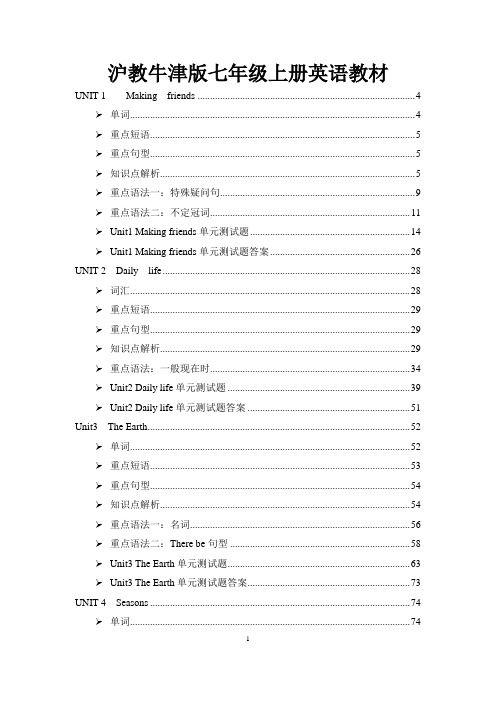
沪教牛津版七年级上册英语教材UNIT 1 Making friends (4)➢单词 (4)➢重点短语 (5)➢重点句型 (5)➢知识点解析 (5)➢重点语法一:特殊疑问句 (9)➢重点语法二:不定冠词 (11)➢Unit1 Making friends单元测试题 (14)➢Unit1 Making friends单元测试题答案 (26)UNIT 2 Daily life (28)➢词汇 (28)➢重点短语 (29)➢重点句型 (29)➢知识点解析 (29)➢重点语法:一般现在时 (34)➢Unit2 Daily life单元测试题 (39)➢Unit2 Daily life单元测试题答案 (51)Unit3 The Earth (52)➢单词 (52)➢重点短语 (53)➢重点句型 (54)➢知识点解析 (54)➢重点语法一:名词 (56)➢重点语法二:There be句型 (58)➢Unit3 The Earth单元测试题 (63)➢Unit3 The Earth单元测试题答案 (73)UNIT 4 Seasons (74)➢单词 (74)➢重点句型 (75)➢知识点解析 (75)➢重点语法:形容词 (79)➢Unit4 单元测试题 (83)➢Unit4 单元测试题答案 (92)UNIT 5 Visiting the Moon (93)➢单词 (93)➢重点短语 (94)➢重点句型 (94)➢知识点解析 (94)➢重点语法:一般将来时 (97)➢Unit5单元测试题 (102)➢Unit5单元测试题答案 (110)Unit 6 Travelling around Asia (111)➢单词 (111)➢重点短语 (112)➢重点句型 (112)➢知识点解析 (112)➢重点语法:条件状语从句 (120)➢Unit6单元测试题 (121)➢Unit6单元测试题答案 (130)Unit7 School clubs (132)➢单词 (132)➢重点短语 (133)➢重点句型 (133)➢知识点解析 (133)般过去时 (136)➢Unit7 School Clubs单元测试题 (142)➢重点短语 (153)➢重点句型 (153)➢知识点解析 (153)➢重点语法:代词 (154)➢Unit8单元测试题 (157)➢Unit8单元测试题答案 (167)UNIT 1 Making friends ➢单词➢重点短语1.colse to 接近 = near 反义词:far (away)from 远离2.go to school 去上学3.be good at 擅长 =do well in 反义词:be bad /poor at=do badly in不擅长4.make friends with 与……交朋友 make friends 交朋友5.all over 遍及6.’d like to=would like to 愿意➢重点句型1.what does···mean?2.welcome to3.I like···because···4.My dream is to be··?5.How old is/are ····?6.What does ····do?➢知识点解析【知识点一】Read a German girl’s blog。
初一七年级上册英语书电子版
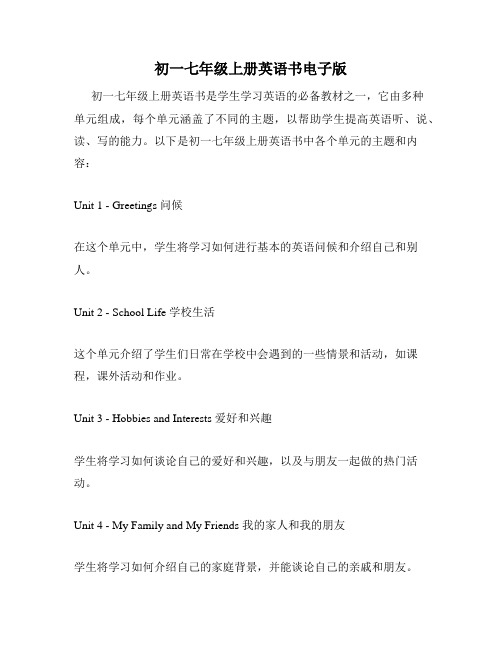
初一七年级上册英语书电子版初一七年级上册英语书是学生学习英语的必备教材之一,它由多种单元组成,每个单元涵盖了不同的主题,以帮助学生提高英语听、说、读、写的能力。
以下是初一七年级上册英语书中各个单元的主题和内容:Unit 1 - Greetings 问候在这个单元中,学生将学习如何进行基本的英语问候和介绍自己和别人。
Unit 2 - School Life 学校生活这个单元介绍了学生们日常在学校中会遇到的一些情景和活动,如课程,课外活动和作业。
Unit 3 - Hobbies and Interests 爱好和兴趣学生将学习如何谈论自己的爱好和兴趣,以及与朋友一起做的热门活动。
Unit 4 - My Family and My Friends 我的家人和我的朋友学生将学习如何介绍自己的家庭背景,并能谈论自己的亲戚和朋友。
Unit 5 - Food and Drinks 食品和饮料学生将学习如何点餐和购买食品以及如何谈论自己的饮食偏好。
Unit 6 - At the Weekend 在周末这个单元涵盖了讨论学生在周末的活动和运动的各种词汇和短语。
Unit 7 - Weather and Seasons 天气和季节在这个单元,学生将学习如何谈论天气和季节,并了解不同季节的特点和活动。
Unit 8 - Holidays and Festivals 假期和节日学生将学习有关国内和国际文化节日的知识,并了解每个节日的历史和相关习俗,如春节、圣诞节等。
以上是初一七年级上册英语书的各个单元主题和内容,每个单元都有其独特的目标和重点,帮助了学生在阅读、写作、说话和听力方面不断提高他们的英语技能。
初一英语_上册Unit8Collectingthings[教材]
![初一英语_上册Unit8Collectingthings[教材]](https://img.taocdn.com/s3/m/7b63ee3a2bf90242a8956bec0975f46527d3a7d4.png)
Unit 8 Collecting things重点短语、句型:be busy doing sth. 忙于做某事unusual collections 不寻常的收集living room 客厅;起居室lots of = a lot of许多the front door 前门follow…into…跟着…进入…like doing sth喜欢做某事in one’s free time在你的空余时间=in one’s spare timesb. spend time/money on sth某人花费时间做某事= sb. spend time/money (in) doing sthtoo much 太多, 非常多;much too 很,非常;be bad for 对…有害的be interested in 对…感兴趣work of art 艺术作品a waste of time浪费时间,白费时间take place 发生;举行,举办show sb. sth = show sth to sb. 给某人看某物Thank you for doing sth 谢谢你…重点句子:1.Sam and Helen’s grandparents collect almost everything.2.They went inside and saw newspapers everywhere.3.The children followed her into the living room and saw lots of toys there.4.There was hardly any space for the children to sit down.5.We both like collecting toys.6.We have a lot of free time.7.So you shouldn’t spend too much time collecting things.8.They made me more interested in Chinese culture.重点单词:unusual adj. ___________ → 反义词:______________________ n.& v. 采仿___________ n. 邮票doorbell n. ___________→ 复数:__________front adj. __________ → 在…前面(内部):___________→ 在…前面(外部):_____________silver adj. ___________ ___________ v. 按;揿;摁soon adv. ___________ ___________ adv. 处处;到处___________ n. 报纸→ 复数:______________________ adv. 向里面→ 反义词:___________follow v. __________ hardly adv. __________free adj. __________ __________ modal v. 应该magazine n. __________ anything pron. __________something pron. __________ → 用于__________句中__________ adv. 以前→ 用于__________时态over adv. __________ = __________重点句子:1.Sam and Helen’s grandparents collect __________ everything.2.They went __________ and saw newspapers everywhere.3.The children __________ her __________ the living room and saw lots of toys there.4.There was __________ any space for the children to __________.5.We both like __________ toys.6.We have a lot of __________.7.So you shouldn’t spend __________ time __________ things.8.They made me more __________ Chinese culture.练习:一、从下面每小题的A.B.C.D选项中选出可以替换划线部分的最佳选项。
- 1、下载文档前请自行甄别文档内容的完整性,平台不提供额外的编辑、内容补充、找答案等附加服务。
- 2、"仅部分预览"的文档,不可在线预览部分如存在完整性等问题,可反馈申请退款(可完整预览的文档不适用该条件!)。
- 3、如文档侵犯您的权益,请联系客服反馈,我们会尽快为您处理(人工客服工作时间:9:00-18:30)。
初一英语上册[教材]宾语补足语。
1、主语是句子所要说的人或事物,回答是“谁”或者“什么”。
通常用名词或代词担任。
如:I’m Miss Green.(我是格林小姐)2、谓语动词说明主语的动作或状态,回答“做(什么)”。
主要由动词担任。
如:Jack cleans the room every day. (杰克每天打扫房间)3、表语在系动词之后,说明主语的身份或特征,回答是“什么”或者“怎么样”。
通常由名词、代词或形容词担任。
如:My name is Ping ping .(我的名字叫萍萍)4、宾语表示及物动词的对象或结果,回答做的是“什么”。
通常由名词或代词担任。
如:He can spell the word.(他能拼这个词)有些及物动词带有两个宾语,一个指物,一个指人。
指物的叫直接宾语,指人的叫间接宾语。
间接宾语一般放在直接宾语的前面。
如:He wrote me a letter . (他给我写了一封信)有时可把介词to或for加在间接宾语前构成短语,放在直接宾语后面,来强调间接宾语。
如:He wrote a letter to me . (他给我写了一封信) 5、定语修饰名词或代词,通常由形容词、代词、数词等担任。
如:Shanghai is a big city .(上海是个大城市)6、状语用来修饰动词、形容词、副词,通常由副词担任。
如:He works hard .(他工作努力)7、宾语补足语用来说明宾语怎么样或干什么,通常由形容词或动词充当。
如:They usually keep their classroom clean.(他们通常让教室保持清洁) / He often helps me do my lessons.(他常常帮我做功课) / The teacher wanted me to learnFrench all by myself.(老师要我自学法语)?同位语通常紧跟在名词、代词后面,进一步说明它的情况。
如:Where is your classmate Tom ?(你的同学汤姆在哪里,)3、构词法:英语构词法主要有:合成法、派生法和转换法。
1、合成法:如:spaceship, headache, basketball, playground等等。
2、派生法:(1)派生名词:?动词+er/or ?动词+ing ?动词+(t)ion ?形容词+ness ?其他,如:inventor, learner, swimming, congratulation, kindness, carelessness,knowledge(2)派生形容词:?名词+y ?名词+ful ?动词+ing/ed ?friendly ?dangerous ?Chinese;Japanese ?English ?French ?German ?国名+(i)an 如:snowy, sunny, hopeful, beautiful, interesting, follwing, daily(每日的),nervous, delicious(3)派生副词:?形容词+ly ?其它,如:slowly, angrily, full?fully, good?well,possible?possibly等等。
3、转换法:(1)形容词?动词,如:dry(干燥的)?dry(弄干), clean(干净的)?clean(打扫,弄干净),等等。
(2)动词?名词,如:look, walk, rest, work, study, swim, go, talk等等。
(3)名词?动词,如:hand(手)?(传递),face(脸)?(面对)等等。
(4)形容词?副词,如:early?early, fast?fast等等。
(5)副词?连词,如:when(什么时候)?(当……时候),等等。
(6)介词?副词,如:in(到……里)?(在里面;在家),on(在…上)?(进行,继续),等等。
一. 词汇? 单词1. 介词:in, on, under, behind, near, at, of1). in表示"在……中", "在……内"。
例如: in our class 在我们班上in my bag 在我的书包里in the desk 在桌子里in the classroom 在教室里2). on 表示"在……上"。
例如: on the wall 在墙上on the desk 在桌子上on the blackboard 在黑板上3). under表示"在……下"。
例如: under the tree 在树下under the chair 在椅子下under the bed 在床下4). behind表示"在……后面"。
例如: behind the door 在门后behind the tree 在树后5). near表示"在……附近"。
例如: near the teacher's desk 在讲桌附近 near the bed 在床附近6). at表示"在……处"。
例如:at school 在学校at home 在家at the door 在门口7). of 表示"……的"。
例如:a picture of our classroom 我们教室的一幅画 a map of China 一张中国地图2. 冠词 a / an / the:冠词一般位于所限定的名词前,用来署名名词所指的人或事物。
冠词有不定冠词和定冠词两种。
不定冠词有两个形式,即a和an。
a用在以辅音音素开头的词前,如a book; an用在以元音音素开头的字母前,如an apple.a或an与可数名词单数连用,泛指某类人或某物中的一个。
This is a cat.这是一只猫。
It's an English book.这是一本英语书。
His father is a worker.他的爸爸是个工人。
the既可以用在可数名词前,也可以用在不可数名词前,表示某个或某些特定的人或事物,也可以指上文提到过的人或事物。
Who's the boy in the hat?戴帽子的男孩是谁呀,------ What can you see in the classroom? ------ I can see a bag.------ Where's the bag?------ It's on the desk.------- 你能在教室里看到什么呀,------ 我能看见一个书包。
------ 书包在哪呀,------ 在桌子上。
3.some和any?在肯定句中用some.例如:There are some books on the desk.桌子上有一些书。
Lucy has some good books露西有一些好书。
?在疑问句和否定句中用any。
例如:Is there any ink in your pen?你的钢笔里有墨水吗, Do you have any brothers and sisters?你有兄弟姐妹吗, There isn't any water in the glass.杯子里没有水。
?记住它们的特殊用法。
?some亦可用于表示盼望得到对方肯定的答复或表示建议、委婉请求的疑问句中,这一点我们不久就会学到。
例如:Would you like to have some apples?你想吃苹果吗,?any也可用于肯定句中,表示"任何的"。
例如: Any one of us can do this.我们当中任何一个都能做这个。
some 和any的用法是经常出现的考点,希望大家能准确地掌握它们的用法。
4.familyfamily看作为一个整体时,意思是"家庭",后面的谓语动词be用单数形式 is ;如把family看作为家庭成员时,应理解为复数,后面的谓语动词be应用are。
My family is a big family. 我的家庭是个大家庭。
My family are all at home now. 我的家人现在都在家。
Family强调由家人组成的一个集体或强调这个集体中的成员。
home指个人出生、被抚养长大的环境和居住地点。
house指"家"、"房屋",侧重居住的建筑本身。
His family are all workers. 他的家人都是工人。
My home is in Beijing. 我的家在北京。
He isn't at home now. 他现在不在家。
It's a picture of my family. 这是一张我全家的照片。
5. little的用法a little dog 一只小狗,a little boy 一个小男孩。
little常用来修饰有生命的名词。
*但little还可表示否定意义,意为"少的",加不可数名词。
There is little time. 几乎没时间了。
There is little water in the cup. 杯中水很少。
? 词组on the desk 在桌子上behind the chair 在椅子后under the chair 在椅子下面in her pencil-box 在她的铅笔盒中near the door 在门附近a picture of a classroom 一个教室的图片look at the picture 看这张图片the teacher's desk 讲桌a map of China 一张中国地图 family tree 家谱have a seat 坐下,就坐this way 这边走二. 日常用语1. Come and meet my family.2. Go and see. I think it's Li Lei.3. Glad to meet you.4. What can you see in the picture? I can see a clock / some books.5. Can you see an orange?Yes, I can. / No, I can't.6. Where's Shenzhen?It's near Hong Kong.7. Let me see.(口语)让我想想看。
